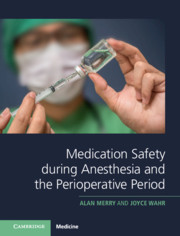Book contents
- Medication Safety during Anesthesia and the Perioperative Period
- Medication Safety during Anesthesia and the Perioperative Period
- Copyright page
- Dedication
- The Snow Vaporizer, Mark II
- Contents
- Foreword
- Acknowledgments
- 1 Introduction to Medication Safety in Anesthesia and the Perioperative Period
- 2 Failures in Medication Safety during Anesthesia and the Perioperative Period
- 3 Failures in Medication Safety in the Intensive Care Unit and Ward
- 4 Impact of Medication Errors on the Patient and Family
- 5 Consequences for the Practitioner
- 6 Why Failures Occur in the Safe Management of Medications
- 7 Errors in the Context of the Perioperative Administration of Medications
- 8 Violations and Medication Safety
- 9 Interventions to Improve Medication Safety
- 10 Medication Safety in Special Contexts
- 11 Legal and Regulatory Responses to Avoidable Adverse Medication Events, Part I: General Principles
- 12 Legal and Regulatory Responses to Avoidable Adverse Medication Events, Part II: Practical Examples
- 13 Barriers to Improving Medication Safety
- 14 Conclusions
- Index
- References
14 - Conclusions
Published online by Cambridge University Press: 09 April 2021
- Medication Safety during Anesthesia and the Perioperative Period
- Medication Safety during Anesthesia and the Perioperative Period
- Copyright page
- Dedication
- The Snow Vaporizer, Mark II
- Contents
- Foreword
- Acknowledgments
- 1 Introduction to Medication Safety in Anesthesia and the Perioperative Period
- 2 Failures in Medication Safety during Anesthesia and the Perioperative Period
- 3 Failures in Medication Safety in the Intensive Care Unit and Ward
- 4 Impact of Medication Errors on the Patient and Family
- 5 Consequences for the Practitioner
- 6 Why Failures Occur in the Safe Management of Medications
- 7 Errors in the Context of the Perioperative Administration of Medications
- 8 Violations and Medication Safety
- 9 Interventions to Improve Medication Safety
- 10 Medication Safety in Special Contexts
- 11 Legal and Regulatory Responses to Avoidable Adverse Medication Events, Part I: General Principles
- 12 Legal and Regulatory Responses to Avoidable Adverse Medication Events, Part II: Practical Examples
- 13 Barriers to Improving Medication Safety
- 14 Conclusions
- Index
- References
Summary
We have presented many facts, exhortations, editorials, and regulatory efforts about medication safety. We begin this conclusion and call to arms by recalling all of the very real patients who have died or suffered from medicaiton harm, and whose families grieve their loss everyday. At times the enormity of the data, theories and regulations obscure that patients every day suffer and die due to medication failures. As we move forward with efforts to change the face of medication safety, we must remember always why these efforts are important. It should be very clear to any reader that we (neither “we” the authors or “we” in the more general sense), do not know all the answers to the challenge of improving medication safety in anesthesia and perioperative medicine. However, it should also be clear now to do nothing is unacceptable. Furthermore, it should also be clear that the situation is far from hopeless – there is a great deal that can be done. Thus, the imperative is to act, not just as individual practitioners but collectively, within and beyond institutional boundary's, in a coordinated, committed and sustained manner.
- Type
- Chapter
- Information
- Medication Safety during Anesthesia and the Perioperative Period , pp. 281 - 284Publisher: Cambridge University PressPrint publication year: 2021

